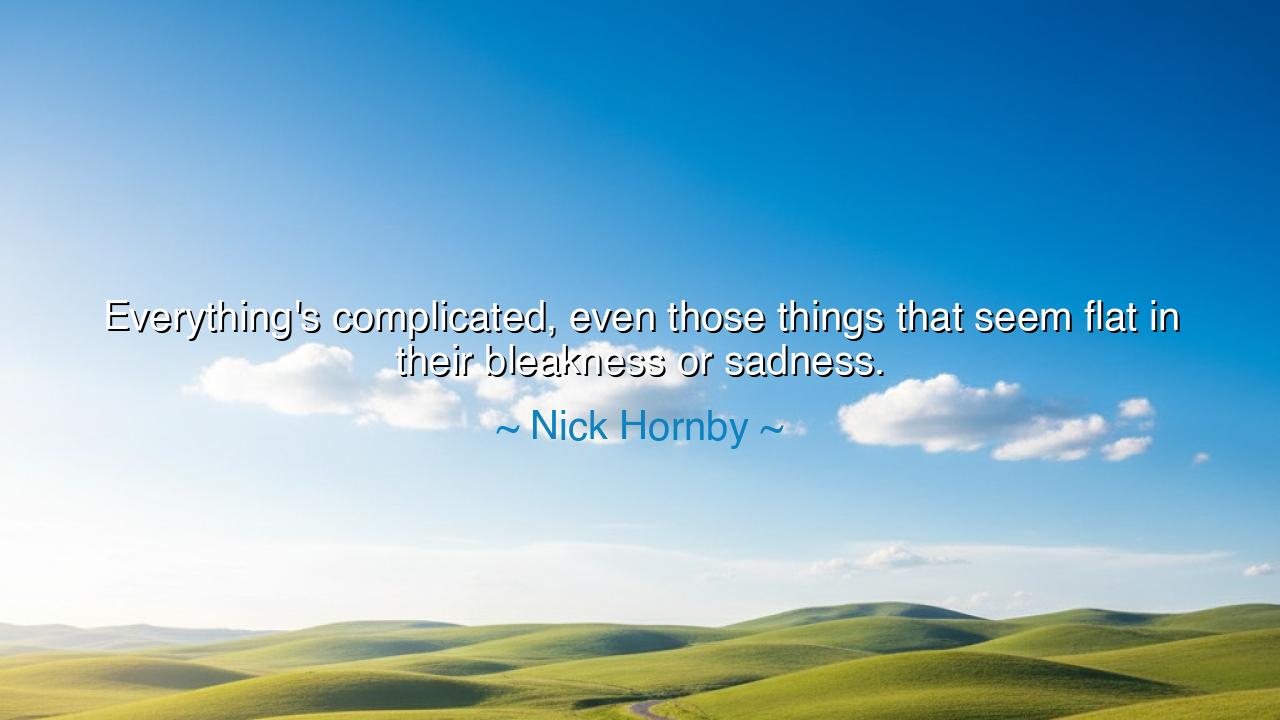
Everything's complicated, even those things that seem flat in
Everything's complicated, even those things that seem flat in their bleakness or sadness.






In the words of Nick Hornby, we find a reflection as deep and intricate as the human heart itself: “Everything’s complicated, even those things that seem flat in their bleakness or sadness.” At first glance, this may seem a simple observation about life’s difficulties—but in truth, it is a profound statement about the complexity of human emotion. For even in the darkest corners of despair, even in moments that appear lifeless and gray, there are hidden layers of meaning, of memory, of subtle light. Hornby reminds us that sadness is not emptiness; it is full of echoes, textures, and contradictions. Nothing in life is truly flat, because the human soul cannot be.
From the dawn of philosophy, the ancients taught that truth is not found on the surface of things but in their depths. The Stoics spoke of life’s paradoxes, how within suffering lies wisdom, within loss lies gratitude, and within bleakness lies a spark of transformation. Hornby, in his modern way, speaks this same truth. When he says “everything’s complicated,” he speaks against the human tendency to simplify our emotions—to say, “I am sad,” as though sadness were a single color. But sadness, as the wise have long known, is a whole landscape: it can hold regret and love, longing and peace, grief and gratitude all at once. It is a storm that nourishes even as it destroys.
Think of Vincent van Gogh, who painted the most luminous works of art in the midst of despair. His life appeared steeped in bleakness, yet his paintings throb with color and motion, proving that sorrow can coexist with beauty. When the world saw his letters, they found not a man crushed by sadness, but one who felt too deeply—who could not look at a field or a night sky without seeing the pulse of eternity within it. This is what Hornby means: even in sadness, there is complexity, and even in bleakness, there is life. What seems flat to the eyes of the unfeeling is, to the awakened soul, infinitely rich.
The human heart is a paradoxical vessel. It can hold despair and hope at once, love and loss in the same breath. Those who see sadness as simple have not yet learned to listen to its language. When a person grieves, they are not only mourning what is gone—they are also celebrating what once was. When they feel lonely, they are remembering connection. Even bleakness itself is rarely pure; it is mixed with the quiet desire to heal, to rise again, to find meaning. Thus, what appears lifeless may be the soil in which new strength is growing.
There is, too, a warning in Hornby’s words. He reminds us not to judge others by the surface of their sorrow. The one who seems numb may be fighting invisible battles within. The one who appears cold may be protecting a wound too tender to touch. To dismiss another’s sadness as “simple” is to betray a lack of compassion. True wisdom, as the ancients taught, is the art of seeing beneath appearances—of knowing that every soul carries a universe within it, even when it seems dark or still.
From this understanding arises a timeless lesson: be patient—with yourself, and with others. When life feels flat, remember that complexity still moves beneath the surface. When you look upon the sadness of another, remember that within that stillness may lie deep courage or silent love. When you feel weary, do not call your heart empty; call it resting. Even when the world seems colorless, you are living a chapter of depth, preparing for the next turn of light.
So, O listener, let this teaching sink into your soul: everything is complicated, and that is the glory of it. Do not fear complexity—it is the proof that you are alive. When you are sad, allow yourself to feel fully, knowing that beneath the gray sky, a thousand hues are waiting to emerge. When others suffer, honor the mystery of their pain. For the human heart, even in its darkest hour, is not a flat plain but a sea of motion, infinite and alive. And from that sea, when the storm has passed, will rise again the quiet, golden sun of understanding.






AAdministratorAdministrator
Welcome, honored guests. Please leave a comment, we will respond soon